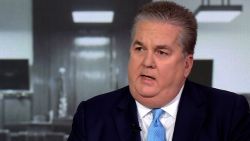Editor’s Note: In this weekly column “Cross-exam,” Elie Honig, a former federal and state prosecutor and CNN legal analyst, gives his take on the latest legal news and answers questions from readers. Post your questions below. The views expressed in this commentary are his own. View more opinion articles on CNN. Watch Honig answer reader questions on “CNN Newsroom” at 5:40 p.m. ET Sundays.
From day one on the job as attorney general of the United States, William Barr has been prejudiced against the possibility that President Donald Trump committed crimes. I mean “prejudiced” in the most literal sense: Barr pre-judged the case in Trump’s favor, and he has acted in accordance ever since
Barr’s prejudice is not a matter of opinion or debate. It is a matter of public record. In 2017, before he became attorney general, Barr told the New York Times there was a stronger basis to investigate the Clinton Foundation than “so-called ‘collusion.’” Barr barely concealed a sarcastic eye-roll – he even put quotation marks around “collusion.” This is rhetoric you’d expect from Trump’s personal counsel, Rudy Giuliani – not from the future attorney general.

Then, in June 2018, Barr sent an unsolicited, 20-page memo to the Department of Justice arguing that Mueller’s “obstruction theory is fatally misconceived.” Barr added the absurd legal view: “There is no legal prohibition – as opposed to a political constraint – against the President’s acting on a matter in which he has a personal stake.” Translation: the President is free to tamper with a case that might hurt him because, well, he’s the President.
Barr also previously told The Hill that Mueller’s obstruction investigation was “asinine.” Again, Barr said this before he became attorney general. There’s no way around it. Barr pre-judged the case.
Since he became attorney general, Barr has acted exactly as he forecasted, taking pains to sanitize Mueller’s findings and protect Trump at every turn. Barr sent a four-page letter to Congress purporting to summarize the conclusions of Mueller’s nearly-400 page report. In the letter, Barr sets forth no actual evidence, but nonetheless declares that Trump did not commit an obstruction of justice offense – contrary to Mueller, who found evidence of obstruction but declined to draw a conclusion about whether the evidence constituted a crime.
In his congressional testimony this week, Barr dodged any issue that might cause Trump discomfort. Barr, demonstrating more obvious tells than a rookie poker player in the pit of a Las Vegas casino, declined to give straight answers about whether he had sent a draft of Mueller’s report to the White House and whether the President was accurate in claiming total exoneration.
Barr also informed Congress that he is in the process of redacting parts of Mueller’s report and that he expects to release the redacted report publicly by next week. Barr takes a broad view of the types of information that should be redacted – including grand jury materials – yet conspicuously fails to pursue available legal mechanisms to minimize redactions and maximize transparency (as discussed in a reader question below). Barr plainly intends to remove as much as the outer limits of the law permit.
Don’t be surprised when Barr continues to take steps to minimize damage to Trump. Trump, and all of us, already knew where Barr stood before he ever got the job as attorney general. Now Barr is doing exactly what he came to do.
Now, your questions.
Anson, Washington, DC: Why isn’t Barr requesting a federal judge to approve the release of the grand jury information contained in the Mueller report?
The short answer is because he likely doesn’t want to. Barr wrote to Congress that he is in the process of redacting information from the Mueller report, including grand jury materials, which “by law cannot be made public.” Mueller served over 2,800 subpoenas, and all of the responsive information qualifies as grand jury material. So, we are talking about a lot of information.
As a general matter – and as Barr asserts – grand jury materials must be kept secret by law enforcement. But that is only a starting point. The Federal Rules of Criminal Procedure permit the courts to authorize disclosure of grand jury materials in some circumstances, and, in 1998, Independent Counsel Kenneth Starr sought and obtained such authorization, which enabled him to include grand jury materials in his report to Congress on President Bill Clinton.
Last week, House Judiciary Chair Jerrold Nadler obtained authorization for a congressional subpoena, calling for the full Mueller report, including grand jury materials. (Ironically – or perhaps predictably, given the nature of politicians – Nadler took a different position when a President from his own party was under fire in 1998). Nadler offered to work with Barr to seek court authorization to release grand jury materials, but Barr testified in Congress this week that he would not petition the courts and would leave it to Nadler to bring a legal challenge to obtain any redacted information.
During his confirmation hearing, Barr vowed to seek “as much transparency as possible” regarding Mueller’s report. Thus far, he has broken that promise. Barr has options at his disposal to disclose grand jury materials – yet he will not even try to use them.
Michael, West Virginia: What are the legal hurdles that House Democrats must clear to get their hands on Trump’s tax returns?
House Democrats may have found a silver bullet to obtain Trump’s tax returns. Using an obscure provision of the IRS code, Rep. Richard Neal, Chair of the House Ways and Means Committee, has filed a formal request with the IRS for Trump’s federal tax returns from 2013 through 2018. On its face, the statute squarely supports Neal’s request: it provides that “upon written request,” the IRS “shall furnish” the committee with any requested tax return. Legally and colloquially, “shall” means “must,” and permits no variation (in contrast to other laws that provide that a person “may” do something or “has authority” to do something, which are discretionary).
The Trump administration has argued that Neal’s request is without precedent. Of course, the issue is unprecedented largely because every president dating back to Nixon has voluntarily produced his tax returns. In any event, it hardly matters whether the statute has been used before, given its unambiguous “shall furnish” language.
White House Chief of Staff Mick Mulvaney has charged that Neal’s request is politically motivated. That may be true, but it is irrelevant legally. Meanwhile, another administration official boldly stated that “this is a hill and people would be willing to die on it,” but they may well end up dying (so to speak) in vain.
Cindy, New York: Regarding Mueller not subpoenaing Trump, is there a rule that if the defendant takes the Fifth, the prosecutor will be barred from subpoenaing the party?
Essentially, yes. The Fifth Amendment of the US Constitution provides that “(n)o person… shall be compelled in any criminal case to be a witness against himself.” Thus, every person – including the President – can avoid answering a subpoena by invoking the Fifth Amendment.
When that happens, the ball goes back to the prosecutor, who has two choices: either (1) accept the Fifth Amendment invocation and walk away, or (2) obtain immunity for the witness – meaning the witness must testify, but his own testimony cannot be used against him. Prosecutors grant immunity sparingly because under Department of Justice policy, immunized witnesses presumptively should not be prosecuted for the crimes about which they have testified.
So even if Mueller had subpoenaed Trump, Trump absolutely would have had the legal right to invoke the Fifth Amendment and avoid testifying. The problem for Trump would have been more political than legal. It cannot look good to the general public for the President of the United States to take the Fifth Amendment, and Trump himself once declared that “the mob takes the Fifth.” Because Mueller decided against a subpoena, however, Trump avoided this difficult decision.
Dan, California: Please explain the relationship between a criminal investigation looking for evidence of crime X and finding evidence of crime Y. That was one of Paul Manafort’s defenses, and the judge struck it down.
Normally, it is quite common for prosecutors to begin by investigating one crime but to end charging something else entirely. I once had a case that began as an investigation of racketeering, extortion and drug trafficking and ended up solving a murder. Prosecutors go wherever the evidence leads, and that often takes investigations down unexpected paths.
As special counsel, however, Mueller was given a specific and more limited mandate: to investigate “any links and/or coordination between the Russian government and individuals associated with the campaign of President Donald Trump” and “any matters that arose or may arise directly from the investigation.” Manafort challenged his prosecution for bank fraud, tax fraud, violations of the foreign lobbying act and other offenses as beyond Mueller’s purview. The court rejected Manafort’s challenge, however, relying in part on the “arose or may arise” provision of Mueller’s appointment.
Mindful of his limited mandate, Mueller referred matters unrelated to Russian coordination to other Department of Justice prosecutors. Most prominently, Mueller sent the Michael Cohen case to the Southern District of New York. That investigation and others that Mueller referred out will continue beyond Mueller’s tenure, and may well lead to additional charges.
Donald, Maryland: If the Trump Tower meeting to get dirt on Hillary Clinton isn’t collusion, what is it?
Mueller did not find sufficient evidence to charge a federal crime relating to the June 2016 Trump Tower meeting, but we do not yet know his reasoning.
Here’s my breakdown: While the Trump Tower meeting was a terrible idea and a disloyal act, it’s a close call whether it was a federal crime. The closest fit is a statute prohibiting any person from accepting, soliciting or receiving a campaign donation from a foreign national.
The prosecution theory would be that, even though the Russians never delivered the promised dirt, Donald Trump Jr. nonetheless solicited the information (solicitation itself qualifies under the statute) and conspired (agreed) with others, including Jared Kushner and Manafort, which is also a crime. On the other hand, attempts and conspiracies are generally less attractive to prosecutors than completed crimes. Charges sometimes lack jury appeal and moral heft if the intended crime never actually happened.
Mueller also might have struggled with whether the offered “dirt” qualified as a campaign contribution. I would argue that the hacked emails would have benefited Trump more than any paid ad, for example, and held enormous value to the campaign. But Mueller might have concluded that the emails carried no particular, quantifiable monetary value – indeed, the Russian state ultimately made hacked emails available to the public through Wikileaks for free – and so they did not qualify under the statute. Or perhaps Trump Jr. and company planned to pay for the emails, which would take them outside the realm of campaign contributions.
Many questions remain, and there’s only one way to know Mueller’s reasoning for sure: full disclosure of his report.
Three questions to watch for next week:
1) When Barr releases the Mueller report, how much of it will we see and how much will be redacted?
2) Will Mueller’s report reveal that he intended the obstruction of justice issue to be resolved by Barr or by Congress?
3) What creative argument will the Trump administration use to argue against the law requiring that the IRS “shall furnish” tax returns upon request of the House Ways and Means Committee?
























